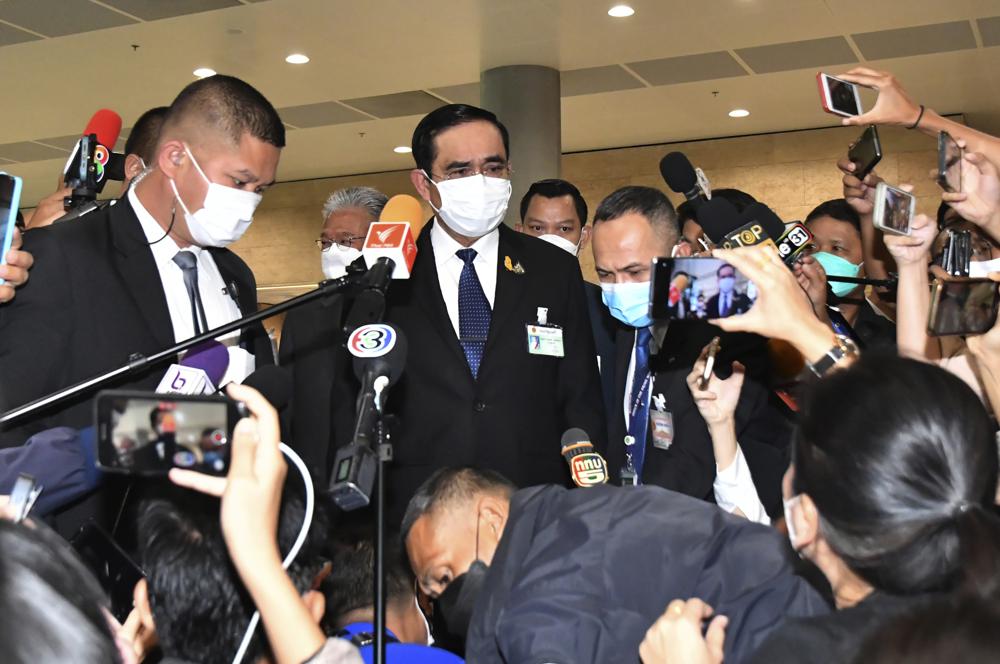Thai instability
It is hard not to wonder whether the current move to suspend his authority is embedded in the coup that he had spearheaded in 2014.
Prayuth still faces pressure from street protests that have been demanding he step down for bungling his response to the coronavirus pandemic.

Thailand Prime Minister Prayuth Chan-ocha talks to reporters at parliament after a confidence vote on himself and five members of his Cabinet in Bangkok, Thailand, Saturday, Sept. 4, 2021.
Thai Prime Minister Prayuth Chan-ocha won votes of confidence in Parliament on Saturday, helping to steady his government after it had come under intense criticism for bungling its response to the coronavirus pandemic.
Prayuth still faces pressure from street protests that have been demanding he step down. Pro-democracy activists opposing his policies have been seeking his resignation since last year and stepped up their efforts in recent weeks.
Advertisement
Major, though not huge, rallies were held this past week in defiance of limits on public gatherings as a virus-fighting measure, and another was scheduled for later Saturday, with organizers vowing to continue until he gets out of office.
Advertisement
Arriving at Parliament ahead of the voting on the censure motions against him and five members of his Cabinet, Prayuth had declared to reporters: “I am confident every day.” Asked if there will be a Cabinet reshuffle soon, he said, “It’s not time yet.”
Prayuth prevailed by a comfortable margin in the House of Representatives, with support from 264 lawmakers showing only a few defections from the 271 members of his ruling coalition, despite intense rumors of a plot among them to force him out.
There were 208 votes in support of the motion, 34 short of the 242 simple majority of the 482 total members the Opposition needed to succeed.
During four previous days of debate, little attention had been given to the details of the Opposition’s harsh accusations that Prayuth’s administration had botched the coronavirus response, countenanced corruption, and mismanaged the economy.
Thai media were instead abuzz with rumors that the secretary-general of the ruling, military-backed Palang Pracharath party, which put together the coalition government that named Prayuth prime minister two years ago, was leading the effort to unseat him and pull the main opposition Pheu Thai party into the coalition.
There was no public confirmation of the rumors, which by Thursday included an accusation that Prayuth’s side met lawmakers to pay them large sums to ensure their support — an accusation he flatly denied. “Everyone came to greet me. As I hardly met them, they just came to give me support. I would not do such a nonsense thing (paying money),” he said.
Prayuth and his government have survived two other no-confidence debates since the 2019 general election. But he was seen as vulnerable now due to his government’s handling of the coronavirus crisis, particularly its failure to secure timely and adequate supplies of COVID-19 vaccines.
He faced no such challenges when he was junta chief and prime minister with unrestrained powers in a military regime installed after he staged a coup as army commander in 2014, toppling an elected government.
The other Cabinet members targeted with no-confidence motions also easily survived Saturday’s votes. They were Deputy Prime Minister and Public Health Minister Anutin Charnvirakul and Transport Minister Saksayam Chidchob from the Bhumjai Thai Party, Labor Minister Suchat Chomklin and Digital Economy Minister Chaiwut Thanakamanusorn from Palang Pracharath, and Agriculture Minister Chalermchai Sri-on from the Democrat Party.
Advertisement